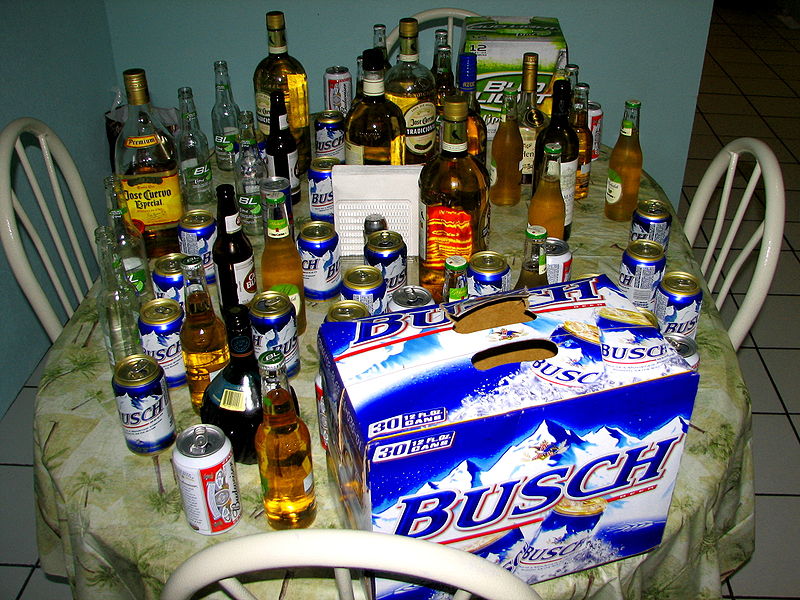
The Alcohol Task Force, a BU organization seeking to limit the harms associated with college drinking, is trying out some new tactics to keep students safe this semester. Dr. David McBride, the director of Student Health Services, says the task force is taking a three-pronged approach, using education,enforcement, and outreach.
“We’re not necessarily advocating for abstinence,” McBride said. “What we’re trying to do is limit the number of bad things associated with students who drink to excess.” In terms of binge drinking being a problem at BU, Dr. McBride noted that last year, 250 BU students were admitted to the hospital for intoxication—a statistic President Brown also mentioned in a letter sent to incoming freshmen and their parents in August. In the letter, President Brown asks parents to speak to their children about the dangers of over-drinking in college. As for whether or not this letter had a strong a effect, the jury is still out. “Yes they got the message,” Dr. McBride said, citing a survey performed regarding the letter, “but we don’t know if they had that discussion.”
Part of the problem is that freshmen arrive at college with expectations of binge drinking as a campus commonality. “The reality is less than half of incoming BU students engage in heavy episodic drinking,” Dr. McBride said. He referenced “iHealth,” an online survey that gathers information about incoming students’ drinking habits. According to the statistics gathered in recent years, the percentage of incoming freshman who do not drink has risen significantly (36% in 2010, compared to 30% in 2008). Similarly, the percentage of students partaking in more than two heavy drinking episodes per month has also diminished (35% in 2007, 30% in 2010). “If you realize that more than half the people aren’t doing that [binge drinking], you may not, too,” Dr. McBride added.
Yet even with these numbers indicating binge drinking has been in decline at BU, the Alcohol Task Force is trying out some new tactics this year. Most notable is the new initiative to strengthen police presence in neighborhoods notorious for disruptive parties. “The purpose is not to bust parties where people are being reasonable,” Dr. McBride said. “It’s about people who are really acting out.” However, this tactic is less about actually punishing students than it is about using the threat of punishment to affect students’ choices regarding weekend activities.
“We’re trying to publicize these efforts,” Dr, McBride explained. A recent BU Today article reported on the impending “crackdown” on alcohol. The article stated, “alcohol-related hospital transports spike during the first two months of the academic year,” yet did not mention that the increased police presence is only in effect for these two months as well. According to the Task Force’s outline of alcohol and party enforcement, officers are only to patrol known heavy-partying areas on the weekends from the start of school until October 30 of this year. For example, Boston Police will patrol the Gardner/Ashford/Pratt (“GAP”) neighborhood on Fridays, Saturdays, and Sundays from 12:00 a.m. to 4:00 a.m. and look for the following violations:
- Minors in possession of alcohol
- Persons procuring alcohol to minors
- Persons consuming alcohol on public property
- Respond to calls for loud parties
- Identify and break up large house parties
- Respond and control large groups and street disturbances
The task force gives similar instructions to the Brookline and BU Police Departments, and adds that after each night of patrol the Task Force will collect data concerning citations of BU Students. However, all of these violations are already illegal (not to mention highly noticeable) and police should always be on the lookout for them, so how does two months of extra patrol cars in a few block radius constitute a “crackdown”?
Since the patrols are not lasting throughout the school year (though the Task Force may extend its initiative), it seems as though this push is geared toward conditioning freshmen to be afraid of going to those neighborhoods, or at least of acting irresponsibly in those neighborhoods, under threat of legal action.
The system is based on similar practices at the University of California. However, a recent article in The Daily Californian, UC Berkeley’s Newspaper, reports that nearly twice as many students were transported to the hospital for intoxication in the first few weeks of school as compared to last year. The article specifies that since the start of the semester, 13 Berkeley students have gone to the hospital due to alcohol intoxication (as opposed to seven students over the same period last year).
Other Task Force initiatives are geared toward individual students and what they can do to stay safe while drinking. Dr. McBride offered some tips on avoiding problems at parties. “Stay with the friends you went with, eat before you drink, [and] keep track of the number of drinks you’ve had,” he said. These are just some ways to prevent landing in a compromising situation later in the night.
Just as important is keeping other people safe. “If you see a friend who’s in trouble,” Dr. McBride advises, “you as a bystander have to intervene—call for help.” This practice is known as “bystander intervention.” Though some students may be concerned about getting caught this way, the Dean of Students’ website states BU’s policy on the matter. According to the university Lifebook, “When the University learns of a student’s illegal possession or use of alcohol or drugs as a result of that student’s seeking medical assistance for him- or herself, or another person, that student ordinarily will not be subject to University disciplinary sanctions for possession or use of that substance so long as the student completes all education and counseling programs recommended by the University.”
As far as their network of outreach goes, Student Health Services offers a wide variety of support groups for students dealing with problems concerning alcohol and drugs. “We’ve had online chats,” Dr. McBride points out, “typically events around alcohol awareness week, reached out to student groups—fraternities and sororities to keep their membership safe.”
While Dr. McBride points out that the issue is “more on the mind of administrators than on the mind of students,” the Alcohol Task Force is not just an administrative body—they seek to have students involved as well. Students can “participate in online chats, [or help] us create messages that are palatable to students.”
Even with all of these new methods, the Alcohol Task Force’s goal has not changed in its seven years of existence. As Dr. McBride put it, “All of us want one another to be safe.”
Click here to read the Task Force Police Instructions.
Click here to read the iHealth survey results.
Click here to read President Brown’s Letter to incoming students.
For more information on Student Health’s alcohol programs, click here.
To get involved with the Alcohol Task Force, contact Elizabeth Douglas at Student Health Services.

